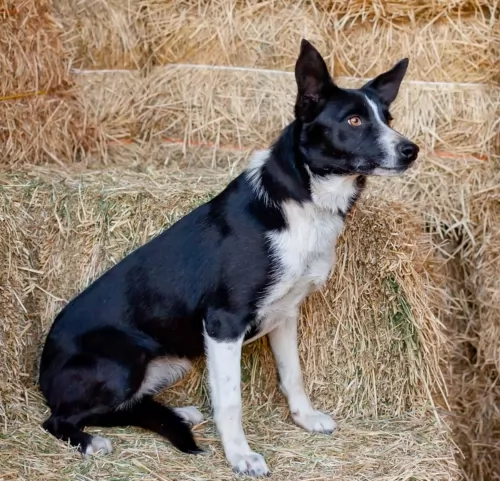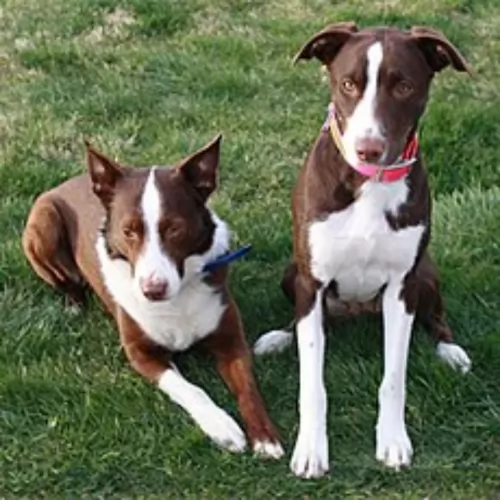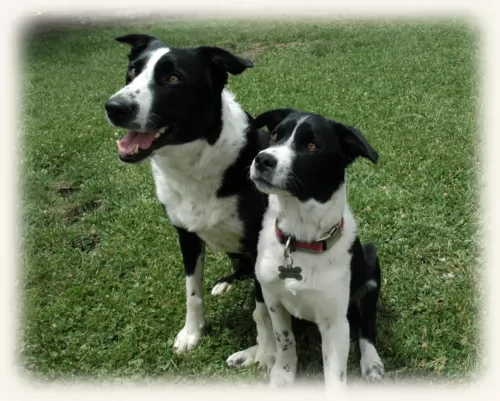 Petzlover
Petzlover McNab is originated from United States but Nova Scotia Duck-Tolling Retriever is originated from Canada. McNab may grow 10 cm / 4 inches higher than Nova Scotia Duck-Tolling Retriever. McNab may weigh 7 kg / 16 pounds more than Nova Scotia Duck-Tolling Retriever. Both McNab and Nova Scotia Duck-Tolling Retriever has almost same life span. McNab may have less litter size than Nova Scotia Duck-Tolling Retriever. McNab requires Low Maintenance. But Nova Scotia Duck-Tolling Retriever requires Moderate Maintenance
McNab is originated from United States but Nova Scotia Duck-Tolling Retriever is originated from Canada. McNab may grow 10 cm / 4 inches higher than Nova Scotia Duck-Tolling Retriever. McNab may weigh 7 kg / 16 pounds more than Nova Scotia Duck-Tolling Retriever. Both McNab and Nova Scotia Duck-Tolling Retriever has almost same life span. McNab may have less litter size than Nova Scotia Duck-Tolling Retriever. McNab requires Low Maintenance. But Nova Scotia Duck-Tolling Retriever requires Moderate Maintenance
 The attractive McNab dog is also known as the McNab Shepherd or McNab Collie. This very lively dog originated in the Mendocino region of Northern California, being specifically bred to withstand tough weather conditions and rough terrain.
The attractive McNab dog is also known as the McNab Shepherd or McNab Collie. This very lively dog originated in the Mendocino region of Northern California, being specifically bred to withstand tough weather conditions and rough terrain.
The dog is becoming popular outside of California now. A Scottish rancher with the surname McNab left Scotland and arrived in California in the 19th century. He crossed Scottish Border Collies with Shepherd dogs and the ranchers in California started using these dogs for herding livestock.
Today they are still being used as herding dogs in California and other countries. The dog isn’t recognized by the American Kennel Club. It was in 2014 that a group of McNab Shepherd breeders established the McNab Shepherd Registry so as to work towards the advancement of the McNab Shepherd.
 The Nova Scotia Duck Tolling Retriever dog was bred in the 19th-century in Nova Scotia, Eastern Canada.
The Nova Scotia Duck Tolling Retriever dog was bred in the 19th-century in Nova Scotia, Eastern Canada.
They were used as hunting dogs. Known as the ‘Toller’, the dog was at first referred to as the Little River Duck Dog but it was in 1945 that it became officially recognized by the Canadian Kennel Club as a pure breed.
The dog is a mix of retriever, setter, spaniel and possibly a farm collie mix breed. It was in 1980 that the breed gained national recognition, being declared the provincial dog of Nova Scotia in 1995.
 The McNab Dog is a medium-sized working dog. The appearance of this dog varies quite a bit. For instance you may come across a dog with erect ears or floppy ears or a long tail or one that is naturally bobbed.
The McNab Dog is a medium-sized working dog. The appearance of this dog varies quite a bit. For instance you may come across a dog with erect ears or floppy ears or a long tail or one that is naturally bobbed.
When it comes to size, you will find that between the males and females they stand at roughly 40 – 64cm and weigh anything from 14 – 30kg.
Most of these McNabs are black or red with white feet, white tipped tails and white markings around the face. The coat is weather resistant and fairly short and dense. You also get tri-colored McNabs. Eyes are usually a brown or copper color though you might find some with bluish eyes as well.
These are such intelligent dogs so with training and socialization you’ll find he is able to learn easily and quickly. He is a self assured dog, so he will respond well to an owner who is firm and fair, patient, kind and consistent.
He is best suited to life in the country as he needs lots of place to run around. If you don’t live on a farm, take the dog for long walks every day as he requires lots of exercise and mental stimulation. He is a loving family member too, getting along well with kids in the home as well as other pets. He is also a good guard- and watch dog, taking his job as protector of his human family very seriously.
 The Nova Scotia Duck Tolling Retriever is a medium-sized gundog. Both male and female stand at about 42 to 54cm in height and they weigh anything from 17 to 23kg.
The Nova Scotia Duck Tolling Retriever is a medium-sized gundog. Both male and female stand at about 42 to 54cm in height and they weigh anything from 17 to 23kg.
This beautiful dog is looked upon as the smallest of the retriever dogs. He has a remarkable medium-length, feathery red, copper or golden coat with some white markings and a long feathery tail with medium length, floppy ears. The coat will need brushing twice a week.
He is a powerful dog and also agile with a somewhat worried expression on his face. The expression becomes bright and animated when he is busy working and you’ll notice that the feathery tail is held high with confidence and delight when he is busy working or doing some activity he loves.
The Nova Scotia Duck Tolling Retriever is an intelligent, alert dog who is eager to please its owners.
They are affectionate dogs too, making a splendid family pet. If you’ve got kids in the home, you can trust this dog to get on well with them.
He is energetic, thriving on both physical and mental stimulation. He’ll love a walk every day as this will give him the chance to get out and sniff around. He won’t be content though with just a walk and will want ball games, walks in the park, hikes and swimming. This dog loves water and is well equipped for it with his double coat and webbed paws.
 The McNab makes a splendid pet and is known to be even-tempered, being friendly and tolerant with his entire human family.
The McNab makes a splendid pet and is known to be even-tempered, being friendly and tolerant with his entire human family.
He gets on well with children in the home as well as other pets. He has always been a hard working pet and doubles up as being an excellent guard dog too. Those who have had the McNab as a pet say that you couldn’t get a more excellent family canine friend.
 Your Toller is a high energy dog, and with the right family he is going to be an absolute joy to have. Give him lots of activities to stimulate him physically and mentally as he is an intelligent dog.
Your Toller is a high energy dog, and with the right family he is going to be an absolute joy to have. Give him lots of activities to stimulate him physically and mentally as he is an intelligent dog.
He is playful and social and full of life, although he is wary around strangers. Just like with most dogs, he will need training and socialization to round him off, making him obedient and well balanced.
With this good-natured pet, you will have a wonderful family friend and enthusiastic sport companion.
 This dog doesn’t really have genetic health issues, but they can suffer with hip dysplasia, a problem that many dogs battle with, whether small or large, young or old.
This dog doesn’t really have genetic health issues, but they can suffer with hip dysplasia, a problem that many dogs battle with, whether small or large, young or old.
They can also suffer with epilepsy and an eye disease such as entropion where the lid of the eye is turned inwards. Check its ears and teeth regularly for infections and keep up to date with his vaccinations.
The McNab is a health dog breed so you aren't likely to face any of these common dog health issues.
 These dogs are robust, but certain genetic disorders do occur in the breed because of the smallish gene pool. Some of the biggest health problems they face are hip dysplasia and progressive retinal atrophy.
These dogs are robust, but certain genetic disorders do occur in the breed because of the smallish gene pool. Some of the biggest health problems they face are hip dysplasia and progressive retinal atrophy.
This eye disease is all about a group of degenerative eye disorders that cause blindness in both eyes of the dog.
The first symptom of this disease is night blindness where you see your dog being reluctant to go outside or to go up and down stairs in dim light. The surface of the eyes will get that cloudy, glazed-over look and as the disease progresses, you’ll find your pet bumping into things.
Mercifully it isn’t painful but you will need to get your pet to the vet to manage the condition.
 You can feed your McNab dog commercial dry kibble, but then you want to be sure its the best quality one. Buying inferior foods means that you’re getting a whole lot of ingredients in the food that are bad – sugar, salt, preservatives, fillers, colorants etc. Rather go for the best brands that will ensure that your dog is getting all the vitamins and minerals he needs.
You can feed your McNab dog commercial dry kibble, but then you want to be sure its the best quality one. Buying inferior foods means that you’re getting a whole lot of ingredients in the food that are bad – sugar, salt, preservatives, fillers, colorants etc. Rather go for the best brands that will ensure that your dog is getting all the vitamins and minerals he needs.
Homemade food is also important and foods such as boiled chicken, brown rice and pasta as well as cooked or raw vegetables chopped up and added to his dry kibble can make for a delicious, wholesome treat. It will be to his benefit if you can every now and then give him some raw meat as well. Make sure to see that he has a constant supply of fresh, cool water.
McNab Shepherds are very active dogs and they are going to require quite a bit of physical exercise as well as mental stimulation. They are dogs who have been used to herding livestock and he loves this busy life. It is why he wouldn’t be happy living in the city but is better suited to farm life or in a home with a large garden. Long walks and hikes will suit him as well as swimming and joining in every game there is.
The McNab is considered to be a low maintenance dog and grooming the short thick coat will be required twice a week. Always check around the eyes and ears as well as inside the mouth for problems and infections.
 Tollers are energetic dogs and you won’t have to extend a second invitation to this dog to join you on your walks, hikes, hunting and swimming. It is perhaps why he is better suited to country living as opposed to living in the city.
Tollers are energetic dogs and you won’t have to extend a second invitation to this dog to join you on your walks, hikes, hunting and swimming. It is perhaps why he is better suited to country living as opposed to living in the city.
You want to ensure the best food for your four-legged friend, but the idea is to keep things simple and nutritious for your dog.
Your pet can’t tell you when he’s got a stomach-ache from eating the wrong foods so you have to be careful what you feed him. You want to make sure that the food you give your dog is balanced for the stage of life he or she is in – puppy, young adult, pregnancy, ill dog or senior dog.
You’ve also got to see whether your dog is small or large, active or a couch-potato type of dog, and choose commercially manufactured foods that cater for the kind of dog he is.
It is fine to feed your dog a kibble food or you can mix in some chopped up boiled chicken, brown rice or pasta and some vegetables such as carrots, sweet potatoes and spinach. Some raw meat added in when you can afford it, will also do your pet the world of good.
You can see from this diet, it is uncomplicated, plain, wholesome food and will do your pet good.
Always be careful of bones with your dog and speak to your vet first before you opt to give your dog bones.
Never leave your pet without a constant supply of fresh, cool water.
Both dogs and owners benefit when a dog has been trained and socialized. The dog is balanced and obedient and a stronger relationship develops between owner and dog because of the dog being well behaved. The Nova Scotia Duck-Tolling Retriever is an intelligent dog so he won’t have any trouble with training.